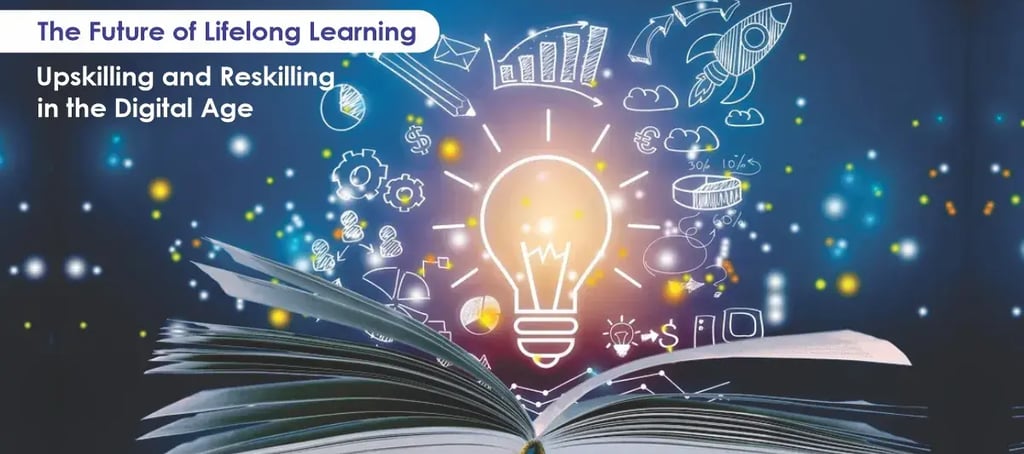Do You Know Why Lifelong Learning Subscriptions Are the Future of Education
Lifelong learning subscriptions are transforming education by making knowledge accessible anytime, anywhere. From skill-based platforms to corporate learning hubs, discover how continuous learning is becoming a necessity in today’s fast-changing world, shaping careers, industries, and personal growth.
KNOWLEDGE & EDUCATION
Do You Know Team
8/27/20253 min read


Education is no longer limited to classrooms, universities, or degrees. In today’s fast-changing world, the idea of “lifelong learning” has become more than just a trend — it is now a necessity. With industries evolving rapidly, new technologies emerging every year, and job roles constantly shifting, individuals can’t rely only on their formal education. This is where lifelong learning subscriptions are taking the spotlight. Platforms offering monthly or yearly subscriptions for unlimited courses, skill training, and knowledge resources are changing the way people learn. They are flexible, affordable, and designed to keep pace with the modern workforce.
Let’s explore why lifelong learning subscriptions are becoming the future of education and how they impact individuals, businesses, and society at large.
1. The Shift From Traditional to Continuous Learning
Traditional education was once seen as the endpoint — graduate, get a job, and stick to it. Today, that approach no longer works. Career shifts, new skills, and digital transformation demand constant upskilling. Subscriptions provide ongoing learning without boundaries.
2. Affordable Access to Premium Knowledge
Instead of paying thousands for a single course or certification, subscription-based models allow learners to access multiple courses for a small recurring fee. This affordability is one of the key drivers behind their popularity.
3. Flexibility and Learning on the Go
With smartphones, tablets, and laptops, learners can access content anytime, anywhere. Whether during commutes, coffee breaks, or late nights, these platforms fit seamlessly into modern lifestyles.
4. AI-Powered Personalized Learning
Many platforms use AI to recommend tailored courses based on career goals, skill gaps, and interests. This ensures learners don’t waste time and directly engage with knowledge that benefits them the most.
5. Corporate Adoption and Workforce Development
Businesses are investing in subscriptions to train employees. Instead of organizing costly training sessions, companies provide team-wide subscriptions, ensuring continuous growth and higher productivity.
6. Diverse Range of Skills in One Place
From coding to creative writing, digital marketing to psychology, leadership to finance — these platforms cover almost every field. Learners are no longer limited to one domain but can expand into multiple areas.
7. Gamification and Engagement
To keep learners motivated, many platforms use gamified features like quizzes, certificates, challenges, and leaderboards. This makes education not just informative but also enjoyable.
8. Breaking Geographical Barriers
A student in India can now learn from a professor in the U.S., while a designer in Brazil can access tools taught by experts in Japan. Subscriptions create a borderless classroom.
9. Career Advancement and Job Market Demand
Employers now look beyond degrees. They value skills, certifications, and continuous learning. Lifelong subscriptions ensure employees stay competitive in a tough job market.
10. Empowering Freelancers and Entrepreneurs
Gig workers, freelancers, and entrepreneurs rely heavily on self-learning. Subscriptions allow them to quickly adapt to new market demands without expensive training.
11. Microlearning for Busy Professionals
Instead of long courses, microlearning delivers bite-sized modules that can be completed in minutes. This appeals to professionals who can’t commit hours daily.
12. Shaping the Future of Education Models
Universities and schools are also experimenting with subscription models, offering flexible learning packages instead of fixed curriculum structures. This hybrid model might define education in the future.
13. Sustainability and Scalability of Subscription Models
Unlike one-time purchases, subscriptions provide platforms with consistent revenue streams, allowing them to improve content quality and scalability.
14. Bridging the Gap Between Generations
From school students to retirees, lifelong learning subscriptions attract all age groups. This multigenerational learning approach enriches society as knowledge is shared across demographics.
15. Global Demand for Upskilling in Emerging Fields
With industries like AI, robotics, cybersecurity, renewable energy, and biotechnology booming, subscriptions help learners adapt quickly to new opportunities.
FAQs on Lifelong Learning Subscriptions
Q1: What is a lifelong learning subscription?
A lifelong learning subscription is a monthly or yearly plan that gives unlimited access to online courses, training programs, and learning materials across multiple fields.
Q2: Why are subscriptions better than traditional one-time courses?
Subscriptions offer affordability, flexibility, continuous updates, and diverse content, making them more practical for long-term learning needs.
Q3: Do employers value online subscription-based learning?
Yes. Many employers recognize certifications and skills gained from reputed platforms. They often prefer employees who demonstrate continuous self-improvement.
Q4: Who benefits most from these subscriptions?
Professionals, students, freelancers, entrepreneurs, and businesses — essentially anyone aiming to stay relevant in a fast-changing world.
Q5: Are lifelong learning subscriptions replacing universities?
Not entirely. Universities still matter, but subscriptions complement formal education by providing ongoing skill updates throughout one’s career.
Conclusion
Lifelong learning is no longer an option — it’s a necessity. The rise of subscription-based learning has democratized access to knowledge, made education more affordable, and created opportunities for millions worldwide. As industries evolve and jobs change, those who continue to learn will thrive. In the coming years, lifelong learning subscriptions will not just complement education — they might very well become the new standard.
#LifelongLearning #EducationFuture #OnlineLearning #EdTech #CareerGrowth #ContinuousLearning #SkillDevelopment #LearningSubscriptions #GlobalEducation #DigitalTransformation
Knowledge
Empowering minds with reliable educational content daily.
Newsletter Signup
© 2025 DoYouKnow. All rights reserved.
Stay Ahead of the Trends – Join Our Newsletter
